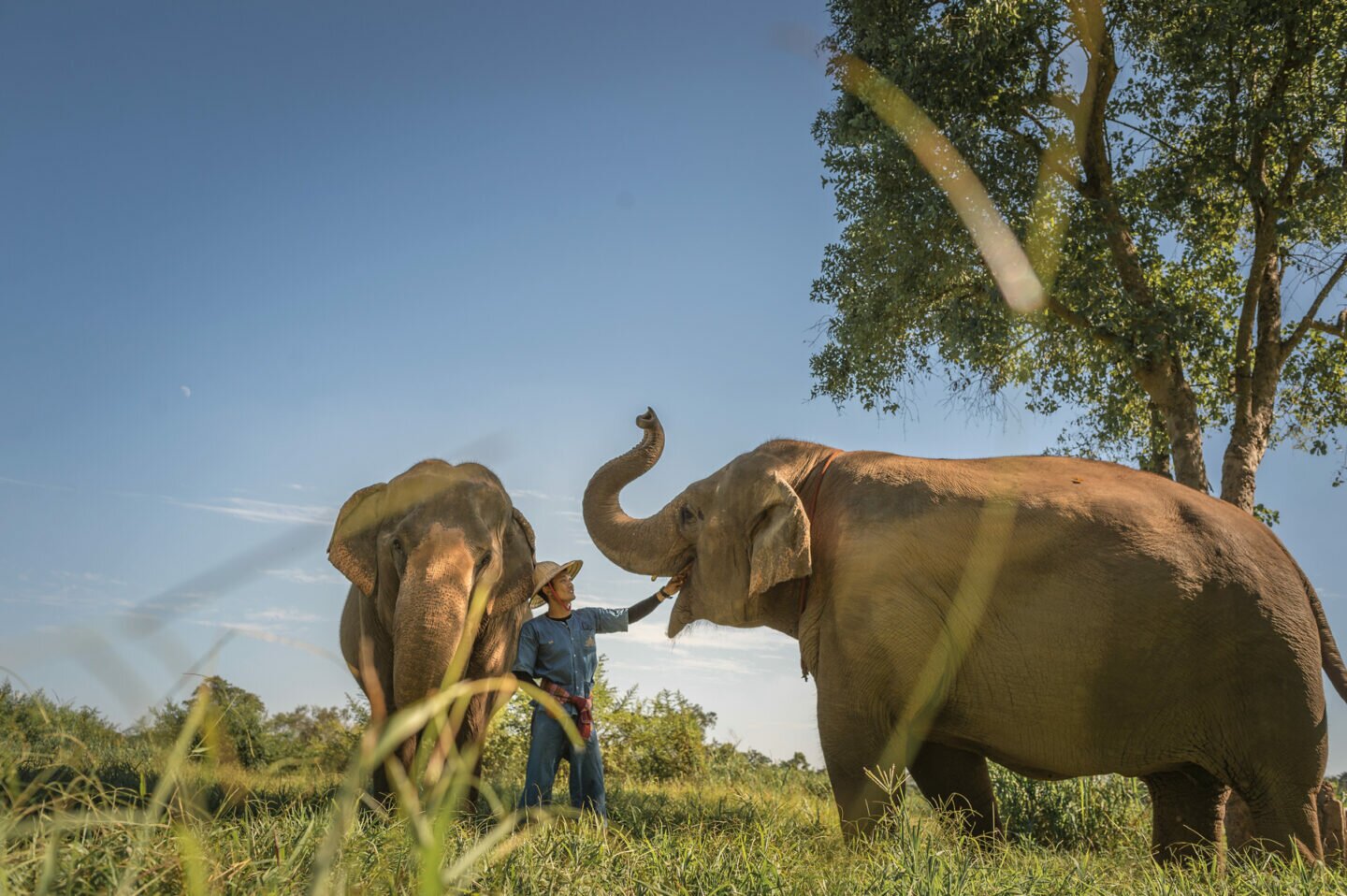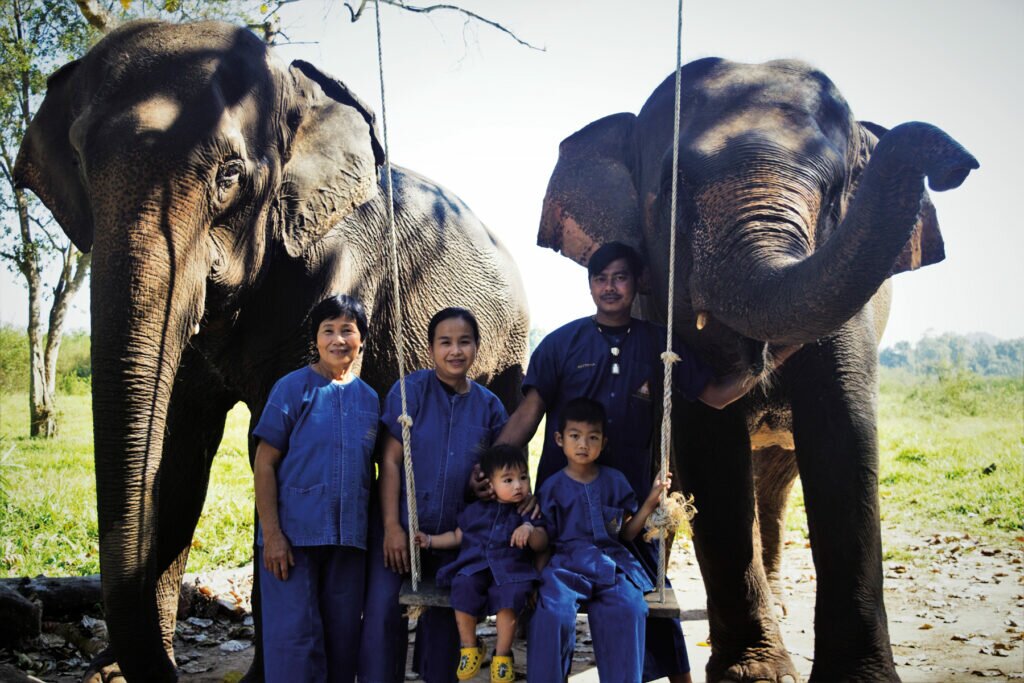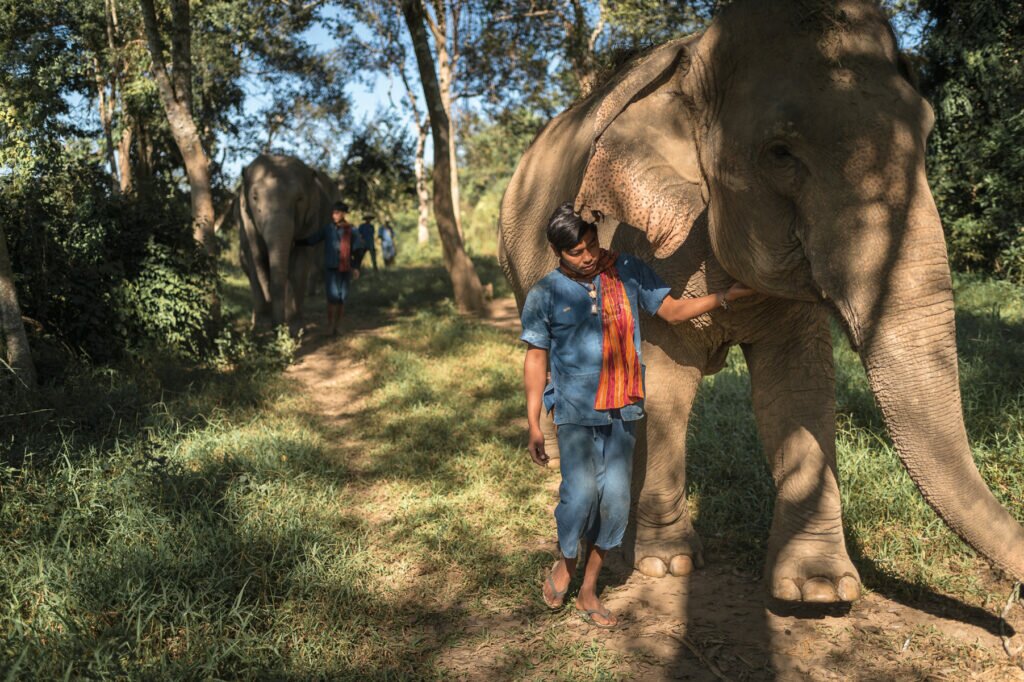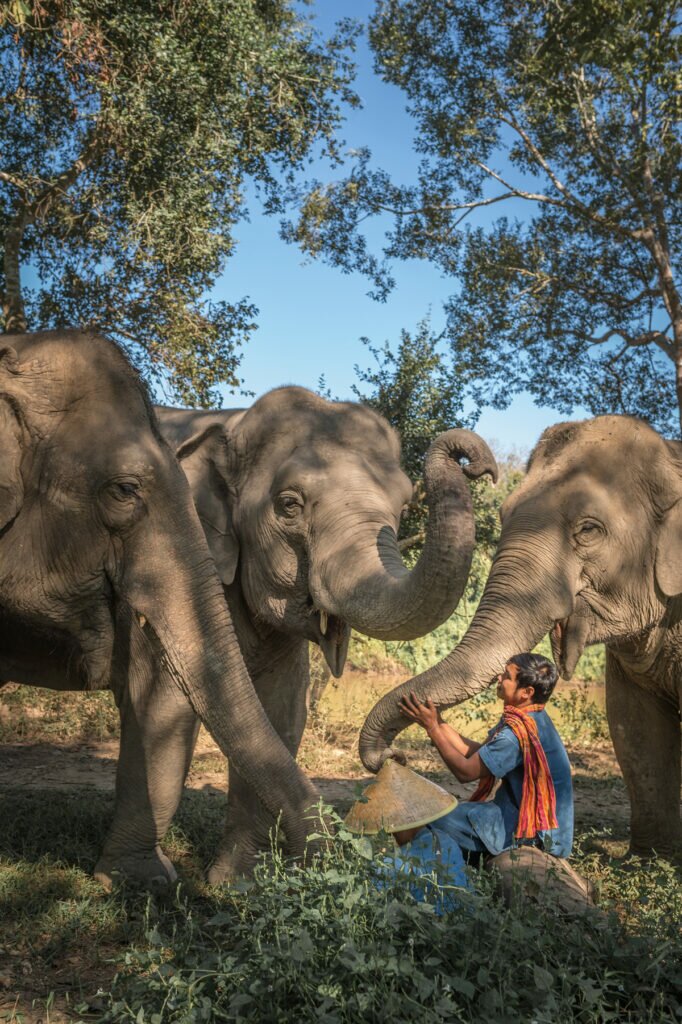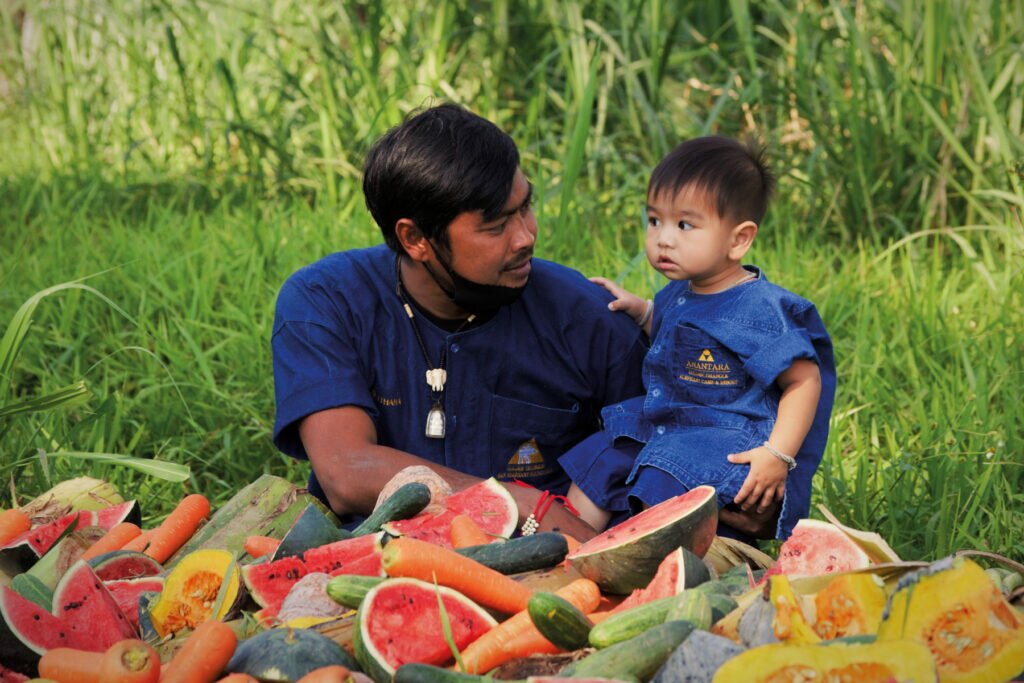In Tamil, Berm is a “pahan”. In Sinhalese, he is the “jurawanayaka” or stable master. In Malaysia, he is a much respected “paappaan”. In Myanmar, he is known as an “us-i” while in Vietnam, he’s called “quan taung”. In Thailand, he is “kwan-chang”.
In India and other parts of the world, he is simply a mahout.
Berm Wattana Salangam, 42, lives with his 41-year-old 3,000kg charge, childhood friend, business partner and favourite aunt at Anantara Golden Triangle Elephant Camp and Resort in Chiang Rai province, 800 kilometres north of Bangkok. Every day, they bathe together in Ruak river, which separates Thailand from Myanmar. On some weekends, his young son Singha comes along too.
“We are lucky. We were rescued and given a new home, a happy life and a future. Without the Foundation, none of us would have survived. We would have starved. Now, my wife and family are happy.”
A new life
By Foundation, Berm means the non-profit Golden Triangle Asian Elephant Foundation (GTAEF), founded in 2006 to help vulnerable captive elephants that had lost the means to feed themselves and their keepers after the Thailand government banned logging in 1989. Thousands — as much as 70 per cent of the working population of elephants — had no hope or employment apart from demeaning shows, exploitative tourist trekking and humiliating street begging.
The world’s Asian elephant population decreased by about 50 per cent over the last three generations and in Thailand, their numbers now stand between 3,000 and 4,000.
The Asian elephant is also on the The International Union for the Conservation of Nature’s Red List of Threatened Species, a result of exploitation, abuse and habitat loss. There is hope, however.
“To date, over 50 elephants have been rescued from Thailand’s city streets; 20 of them now live in the jungle environment of Anantara’s Elephant Camp on the border with Myanmar and Laos. The mahout’s family, who receive English lessons and all the profits from the sale of garments from the silkworm business, live in security and receive social upliftment. The kids get to go to school,” says UK-born John Roberts, group director of sustainability and conservation at Minor Hotels.
-
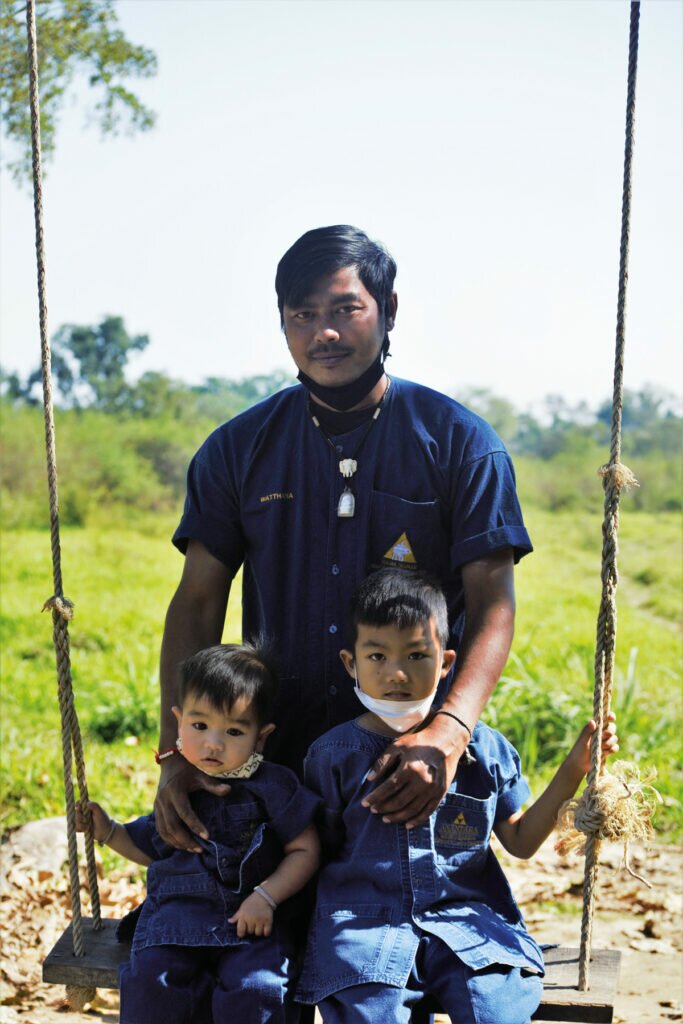
Berm with his children. -
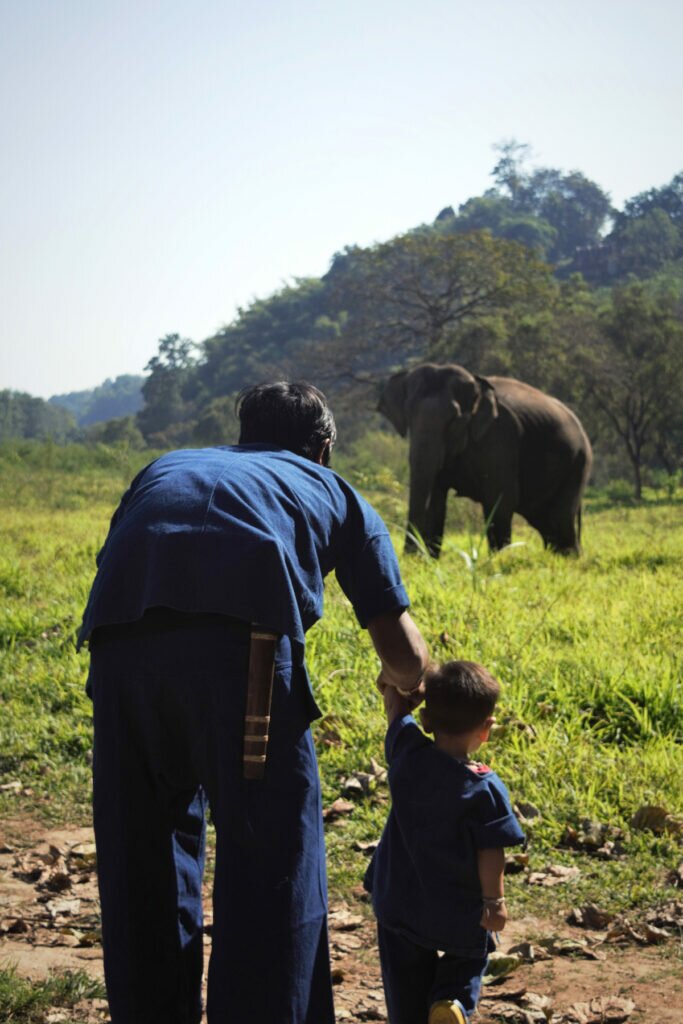
Berm with his eldest son Singha.
The Foundation also pays four rangers to patrol the Koh Kong elephant corridor in Cambodia’s Cardamom Mountains.
Mahouts are just as important as the elephants. If you don’t have a happy mahout, you won’t have a happy elephant. In traditional Thai culture, being an elephant keeper has great spiritual significance. Typically passed down through the generations, the mahout receives an elephant at an early age and the pair remain bonded to each other throughout their lives.
Thanks to the work of Mexican animal trainer Gerardo Martinez, the mahouts receive targeted training techniques and learn positive reinforcement rather than punishment. In Train the Trainer sessions, no bull hooks or goads are used.
The wives of mahouts are taught to work the loom. They prepare silk thread and make silk scarves, as well as collect silkworm pupa and mulberry leaves to feed the elephants. Occasionally, they also look after the elephants.
Organisations like the GTAEF play an important role in maintaining the elephant population and keeping them healthy. Research has revealed that a lack of enrichment can lead to mental deterioration and promote negative behaviours like head bobbing. In the wild, elephants walk for long periods of time, covering vast areas, so it’s crucial to prevent obesity, ensure the health of their digestive systems and maintain their foot and joint health. Footcare and regular pedicures are also important. Elephants also forage up to 20 hours a day and can eat over 150 different types of vegetation.
Surviving the pandemic
Roberts says: “When we were trying to get elephants off the streets, we didn’t have a process. I’d go to Bangkok and meet mahouts at random on the streets. Once we had a few living with us, we’d go down with an already converted mahout and mobile phone, meet the elephants in their camping places… The system was based on our income, so I’d find a sponsor first and then find the elephants. After a while, as our reputation grew, mahouts approached us.”
Tourism is also a key source of revenue. At the Golden Triangle resort, guests pay 2,000 baht ($83) to roam with the elephants and meet the mahouts. The resort has two five-star Jungle Bubbles that allow guests to sleep among elephants.
It recently opened a two-bedroom Jungle Bubble Lodge with a plunge pool.
The Foundation distributes almost US$400,000 ($541,360) a year to keep all the elephants and mahouts fed, and projects going. Unfortunately, when Thailand’s doors shut in April 2020 due to the pandemic, it also cut off GTAEF’s source of funding.
Thanks to online fundraising, loyal supporters and a lot of cost cutting, the Foundation has kept the projects alive for two years. They’ve also taken on additional responsibilities like supporting vets and bringing in hungry new elephants.
“The current Covid-19 crisis hit the elephant community far harder than SARS did. We could easily have seen a return to street begging and slow starvation. But we have largely avoided that thanks to a great organisation, the Thai Elephant Alliance Association. But it has been and is still tough, and we are desperately short of funds.”
Now that we’re at the tail end of the pandemic, tourism has rebounded and income opportunities for mahouts have returned. However, there’s still more that needs to be done.
“Coupled with law enforcement efforts in the cities, we could start working on welfare in our own camp and how to spread what we learnt throughout Southeast Asia,” says Roberts. “We have identified veterinary safety net as one of the prime concerns. With partners, we have subsidised wages, but we still need more money for the vets.”
Recording mahout culture
Roberts has been part of mahout culture for 20 years.
“It has shaped my life and my entire way of thinking. I’m fascinated by the older aspects of it, such as the mahouts and elephants that I worked with in Nepal or have met in India or in the mountains of Northern Thailand, who still live close to the forest and live more of their traditions. I remember the nights drinking whiskey with mahouts in Chitwan National Park, before mobile phones and karaoke, with mahouts singing old songs surrounded by elephants,” he says.
“We usually work with the Kuay people of Surin province, who have an ancient tradition with its own quasi religion and language. But sadly, years of living outside the forest and street begging seem to have hardened most mahouts against their ancient traditions. Nowadays, it seems only the oldest of elders can remember and talk about their forest and elephant catching days.”
Roberts has begun documenting the history of mahouts, and has a series of interviews with a respected elder, which will be part of a verbal history library. He has also started recording projects with two more elders.
The GTAEF also works with the Thai government and other organisations in “bigger picture” conservation projects. It funds research and clinics that use elephants in therapy sessions for children with autism and Down’s Syndrome.
“Elephants make great assistant therapists,” says Roberts. “We equipped the first elephant (chang) hospital in Krabi, southern Thailand, with an ATV, and also donated a purpose-built elephant ambulance and gantry (to help lame elephants stand) to the Thai Elephant Conservation Centre. We also built the world’s first facility to conduct scientific research on elephant intelligence.”
The Foundation is also involved in community-based projects to help elephant conflict, facilitate improved medical outreach and elephant monitoring watchtowers, and has also started reforestation initiatives.
Keeping the tradition alive
“We’ve turned what was ostensibly set up as a minor tourist attraction into something that is helping wild elephants while using science to drive the world’s knowledge of elephants forward. We have rangers working against the bushmeat trade and literally keeping pangolins out of the pot,” says Roberts.
“I’m proud of how far we’ve come in the elephant welfare attitude of our mahouts from the earlier days when we were just happy to have elephants off the streets. Now, the mahouts take part in elephant-friendly training, make suggestions for our environmental enrichments and more. It makes me believe that we have made genuine change and created something that will still be here should we disappear tomorrow.”
